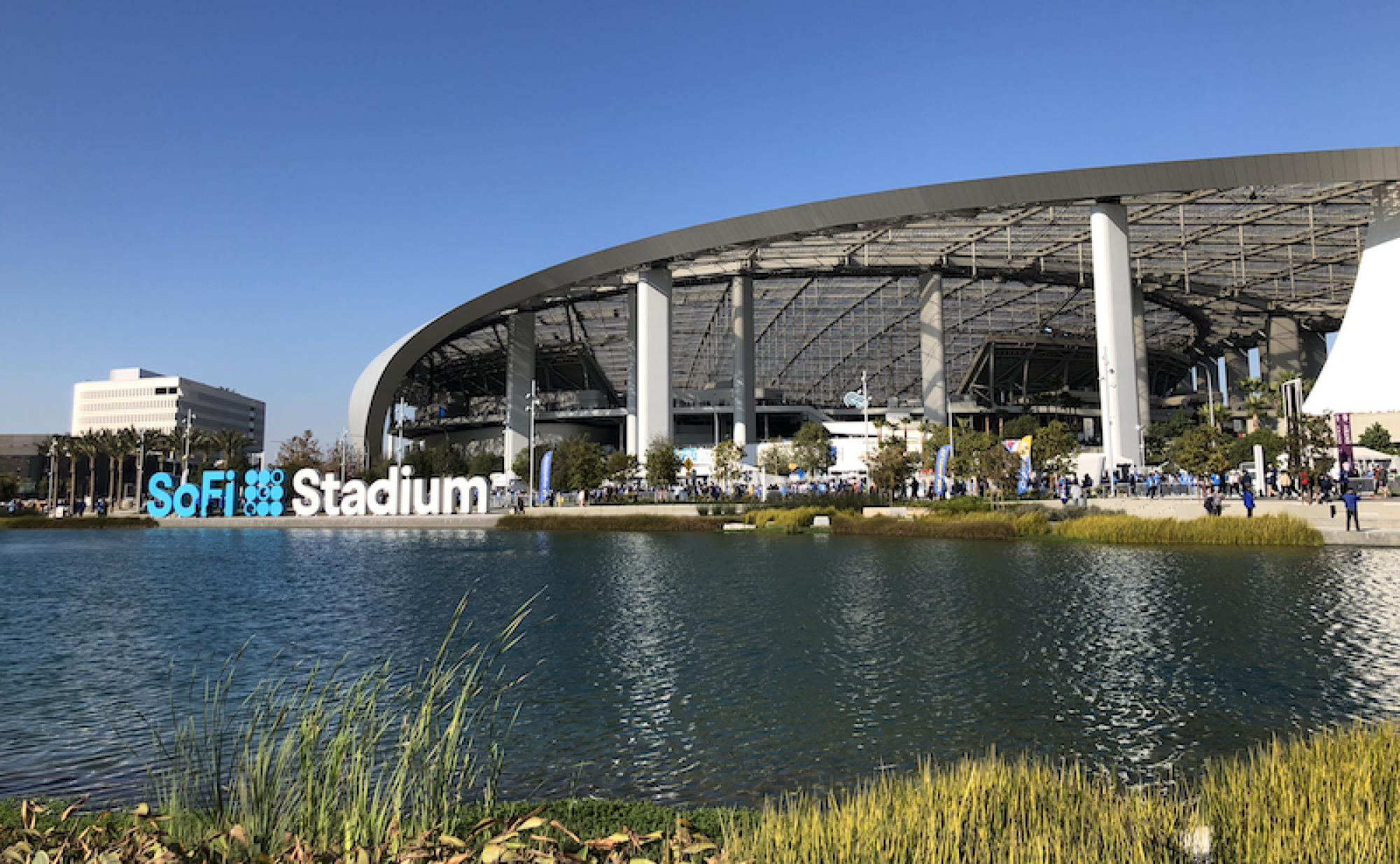It’s Sunday afternoon. Tens of thousands of NFL fans have congregated in the SoFi Stadium parking lot, filing into the futuristic, spaceship-lookalike stadium as kickoff approaches. Streets surrounding the stadium are blocked off to control traffic as thousands approach the stadium. Police and security line the streets on every block near the SoFi lot.
Just across Prairie Avenue and Century Boulevard, new apartment complexes line the streets, with almost every Zillow listing in Inglewood, the city SoFi resides in, promoting close proximity to the stadium to potential new tenants.
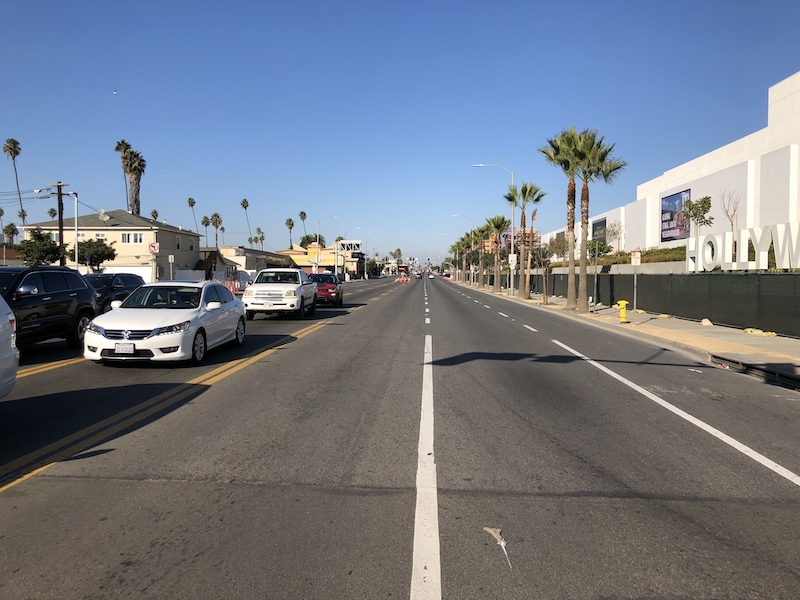
The residents of Inglewood are living through a radical transformation. Over the last ten years, The Forum arena was renovated and now hosts frequent concerts. Meanwhile, SoFi Stadium, the $5 billion home to the NFL’s Los Angeles Rams and Los Angeles Chargers, replaced one of the city’s most beloved landmarks, the Hollywood Park racetrack, and the Los Angeles Clippers began construction on another new stadium just across the street from The Forum and SoFi Stadium.
As a result, housing costs are climbing at a rate even higher than the rest of Los Angeles. Small businesses are struggling and many residents say they are being left behind as Inglewood changes.
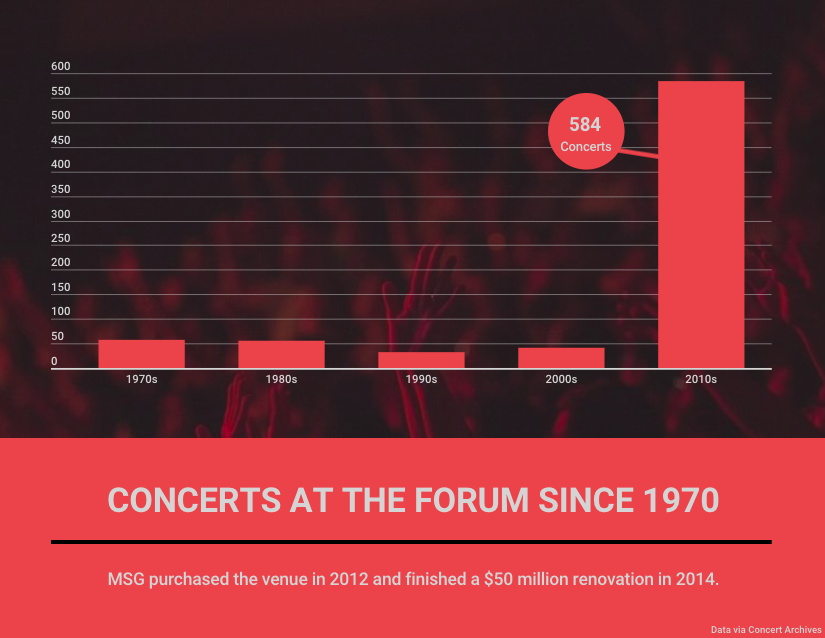
“The city council, their priority is entertainment,” said local activist and founder of the Lennox-Inglewood Tenants Union, Alexis Aceves. “They just want to create a welcome environment for transients. The fabric of the community [has changed] to where visitors feel comfortable and want to live there.”
When sports stadiums or concert arenas are built, city officials and land developers typically make the same promises: higher property value and more revenue for local businesses.
Inglewood Mayor James T. Butts, who has served in his position since 2011, has promoted the city’s annual increase of its average home sale price in his “State of the City” address as far back as 2015.
“I can say without fear of contradiction, there’s probably no place else in the country that’s experienced that type of increase,” Butts said of the rising average home price in his 2015 speech.
New research shows the trend continued in the next six years. Brad Congelio is a professor who specializes in data analytics and sport analytics. He studied the impact of SoFi Stadium on housing costs in Inglewood. Congelio’s research is yet to be published, but it addresses SoFi Stadium’s impact on housing markets and the city’s demographics.
Congelio found that houses within 5 miles of SoFi Stadium have seen their value increase by 64% since the announcement of SoFi’s construction in 2015, almost double the rate of houses outside of this radius. He believes the stadium is directly responsible for these changes.
“Anybody who has common sense and knowledge knows that if SoFi Stadium wasn’t built, you wouldn’t be seeing numbers like this,” Congelio said.
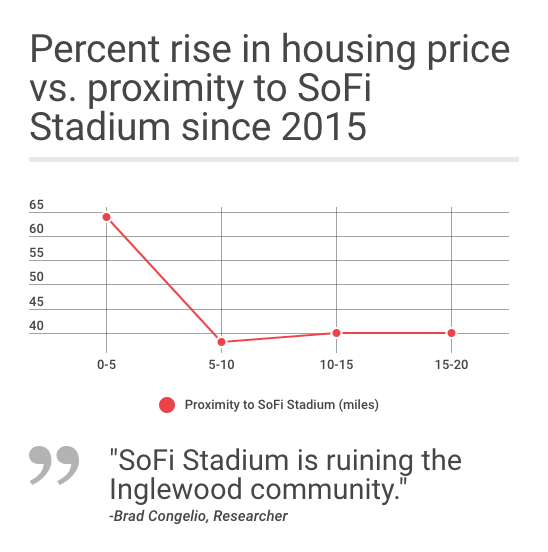
Congelio believes residents who rent their housing will find it difficult to keep up with skyrocketing housing costs.
“Rental units within a 10 mile concentric circle of SoFi Stadium are growing at a rate of 22% after SoFi,” Congelio said. “The next highest [rate] is 12% at a 10 to 20 mile radius.”
Congelio found that one community in particular is bearing the brunt of the rapid changes.
Black residents make up 85% of the population in Inglewood’s main “area of growth,” a three-mile concentric circle around SoFi Stadium.
Congelio’s research found that nearly half of single Black residents in California are “rent-burdened,” while just under 40% of single white residents fall under the same classification, according to American Community Survey data.
“The existing residents that are trying to stay put and get through this, I don’t know how they’re going to do it.” Congelio said. “SoFi Stadium is ruining that enclave, pushing people out who have lived there because it was financially reasonable for them to live there. It’s gentrification. It’s what happens when you invest private equity into an area like that.”
The challenges don’t end with housing costs. Owners of small businesses on Prairie Ave., across the street from SoFi, say their businesses have been impacted by the traffic and parking issues that concerts and sporting events bring. Inglewood’s mayor, James Butts, has previously said the change Inglewood is undergoing will help these businesses.
“Businesses will only benefit when people that have more disposable income come into your city, because they can buy more things,” Butts said in a 2016 interview when asked about the impact gentrification would have on local businesses.
But many owners and employees said that’s not what is happening. Instead, business is slow on days that SoFi or The Forum host events because local residents have little interest in dealing with accessibility issues getting to local stores. The tens of thousands of game-goers and concert-goers have little interest in supporting local businesses, according to one owner who did not want to go on the record but said their personal experience was that stores didn’t benefit from the increased presence of visitors.
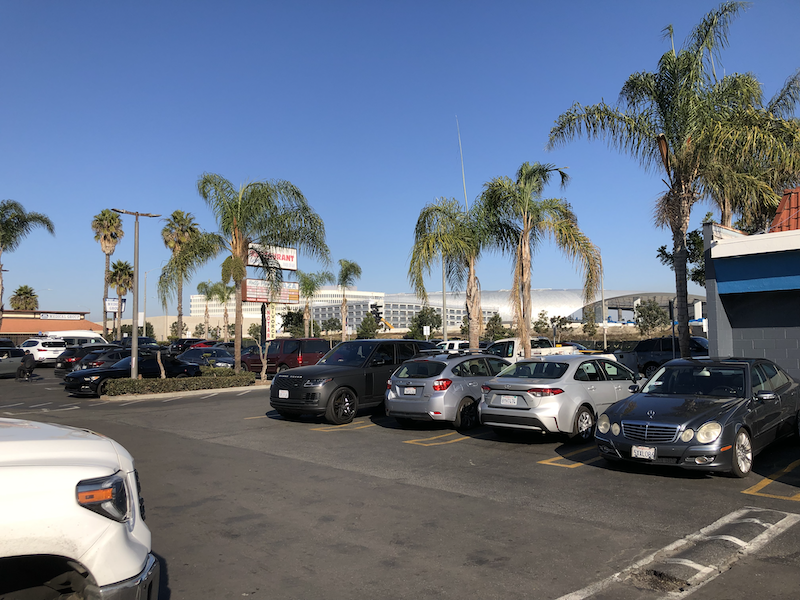
Five business owners and employees spoke on the condition of anonymity due fear of potential retaliation from landlords.
Two restaurant owners said they actually lost money on game days. They’re left with bags of prepared food when customers give up on their takeout orders because of heavy traffic caused by SoFi and The Forum. Three other business owners and employees said they close early on days of concerts and NFL games due to the lack of customers.
Aceves and lifelong Inglewood resident Eddie Cruz, who lives just half a mile away from SoFi Stadium, said small businesses are being replaced by chain stores, including a laundromat replaced by a 7-Eleven and a restaurant giving way to a Starbucks. The challenges presented by the stadium and the prioritization of commercial relevance extend further.
For residents who live in close proximity to the stadium, traffic, the lack of available parking and noise levels make living in the new Inglewood even more difficult. Cruz said NFL games at SoFi Stadium make him feel like an outsider in his own community.
“It feels like we have to take that day, specifically, to stay at home so we don’t bother or interact with [game-goers] because they don’t want to see us,” Cruz said. “I have to accommodate my schedule around them, because if I go out, I’m stuck in traffic.”
After spending a Sunday in the local community the same day an NFL game was being played at SoFi, I saw hundreds of NFL fans driving away from parking spots on residential streets. While there are signs indicating parking at nearby shopping complexes and on residential streets is restricted, locals say those rules are rarely enforced and ineffective.
“It was meant to patrol who can park here … but it hasn’t done that,” Cruz said. “People from the outside still come and park in our residential areas and they don’t get ticketed, there’s no penalties for them. The ones who are being harmed the most are us.”
Every photo on the “City Council” section of the City of Inglewood’s website features The Forum, SoFi Stadium or references to the Rams or Chargers. Almost every listing on Zillow within 5 miles of SoFi Stadium mentions its proximity to the stadium in the listing description. It seems clear what Inglewood’s City Council and private land developers investing in the area want the city to become.
“A lot of people would say that city councilmembers completely abandoned the working-class constituents of Inglewood,” Aceves said.
In less than a decade, Inglewood has turned The Forum into a prime destination for concerts, built a multi-billion dollar NFL stadium and approved a proposal to construct a new NBA arena. voting unanimously on each project.
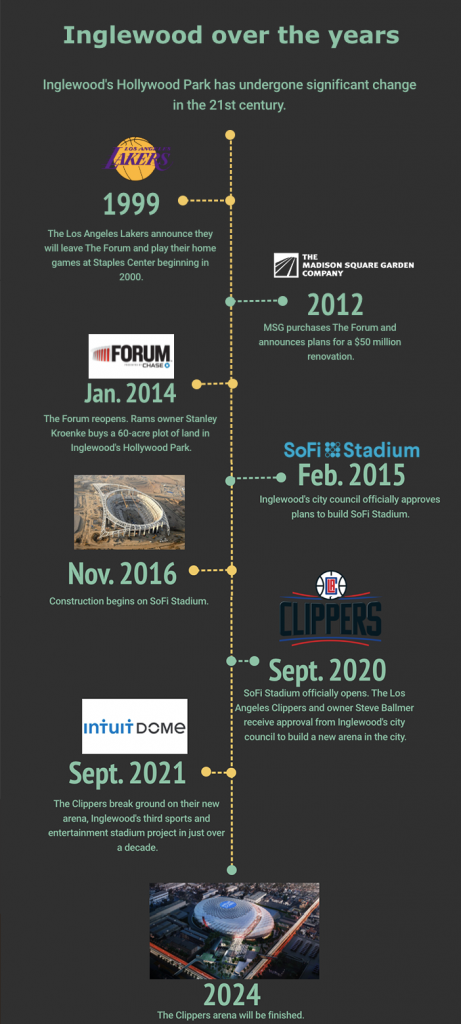
In Sept. 2021, construction began on the Clippers’ new NBA arena, the Intuit Dome, which will become Inglewood’s third major sports and entertainment stadium in a one-mile stretch down Prairie Ave. Cruz questioned why the city Council approved the Intuit Dome plans.
“I was curious to know the motivation behind a proposal like that,” Cruz said. “I feel like another stadium is going to bring another increase of rent. People are going to move out because they can’t afford it any more. It just leaves a very bleak view of the future for the people who have lived here.”
Butts called Inglewood “the sports entertainment capital of the United States,” at the groundbreaking ceremony for the Intuit Dome.
Tenant unions and community organizations such as the Lennox-Inglewood Tenants Union, the Uplift Inglewood Coalition and the ING Fellowship have protested multiple times since 2019 in opposition to the Clippers arena, citing concerns about traffic, unaffordable housing and displacement in protests in front of the stadium site.
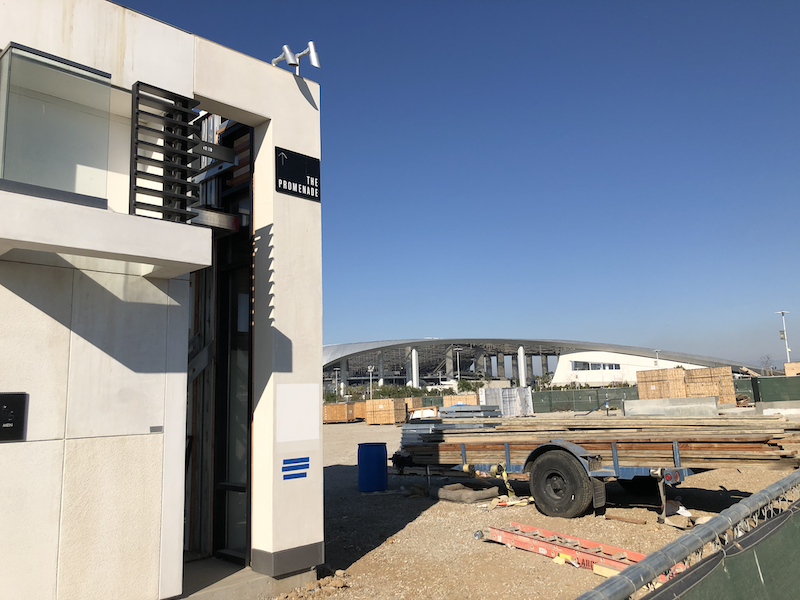
Aceves said city officials sometimes seem to be hiding from the public despite these protests. City Council meetings were moved from late evenings to early afternoons in 2015, the same year the Council approved the SoFi Stadium project. The meetings have since been moved back to 7 p.m.
When the Council was trying to approve the construction of a Tru Hilton luxury hotel in the Hollywood Park area near SoFi stadium and The Forum in 2018, local community organizers went door-to-door and informed residents that there were three elementary schools in close proximity to the proposed hotel site and that the community would likely see a significant rise in traffic and a decrease in parking availability with an increased tourist presence in the community on a regular basis.
“No one even knew it was being built,” Aceves said. “The public was never consulted because they would have said no.”
The Tru Hilton project was approved by Butts and the City Council in Nov. 2018 and is set to be completed in Jan. 2022.
Aceves believes city officials are being directly influenced by wealthy landowners, businesspeople and property developers.
Councilmember Alex Padilla was involved in controversy after a family member purchased land near Hollywood Park in 2014.
Padilla’s son, Miguel, worked for the company that made the purchase, HP Capital, which is a “family-owned” business according to its website. Miguel specialized in property acquisitions at the time of the purchase. Councilmember Padilla denied sharing any information with his nephew, who owns the company, or his son and refused to discuss details of the case with the media.
William Christopher, who sold the parcel of land to HP Capital, said he would not have sold at the price he did had he known the SoFi stadium project was in the works.
Councilmember James Dotson was fined in 2019 for accepting Rams tickets as a gift from the team. The $750 value of the tickets exceeded the legal limit for gifts to public officials, leading to Dotson’s penalization.
Rams owner Stanley Kroenke donated over $118,000 over four separate reelection campaigns to three Inglewood officials from 2006 to 2015: Butts, Padilla and Dotson.
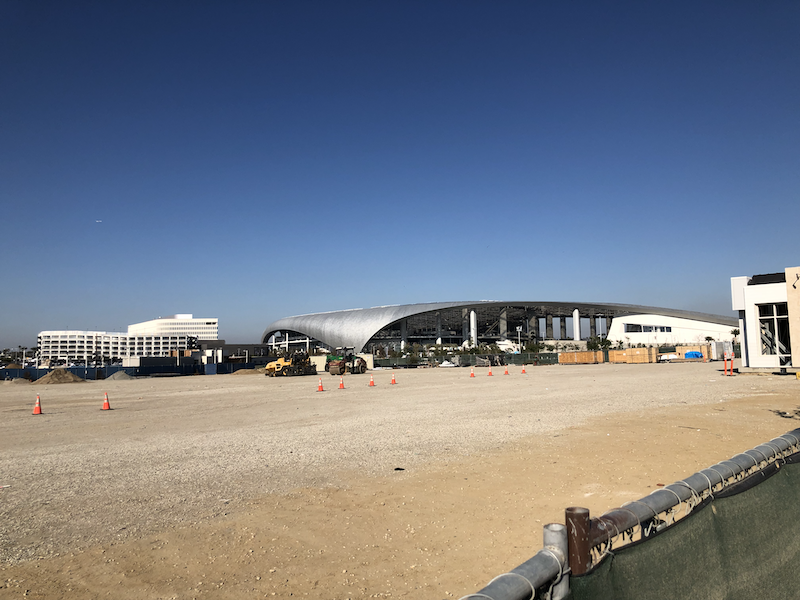
Chiderah Nwafor, a college student whose family has lived in Inglewood her entire life, notices the increased presence of visitors from outside the community who identify as white and are usually financially affluent.
“[The City and new investors] are clearly catering to one specific demographic,” Nwafor said. “They’re preparing for an influx of people who can afford it.”
Nwafor notices the change in focus of the city in which she has spent her entire life.
“There’s been no improvements to infrastructure except new hotels and apartments,” Nwafor said.
The NFL has already built what’s being referred to as its “West Coast headquarters” on the same lot as SoFi. Congelio believes the league is responsible for what’s happening in Inglewood, but is skeptical of how the impact on the community can be mitigated.
“The NFL, for as rich as they are, as wealthy and powerful as they can be, I don’t know if they could do something to ease these things from happening,” Congelio said. “But they can at least try. It’s just bad. Words escape me, almost, just in terms of how hopeless the situation seems.”
Congelio believes SoFi Stadium is “ruining” the Inglewood community, as white residents move into the city with increased frequency, a concept Congelio referred to as “reverse white flight.” “White flight” is a phrase used to describe the exodus of white residents from communities with high populations of people of color in the 20th century. Congelio believes white residents moving to Inglewood are displacing long-time Black residents.
Census data shows the Black population in Inglewood has steadily declined since 2000. In 2000, Black residents made up 47% of Inglewood’s population, compared to 44% in 2010 and 40% in 2020. White residents made up 19% of Inglewood’s population in 2000, compared to 28% in 2020.
Congelio said SoFi Stadium has “absolutely not” benefited the residents of Inglewood.
“Capitalists looked at Inglewood and saw dollar signs,” Aceves said. “It’s financially beneficial to live there and invest there.”
As SoFi celebrates its first year being open to the public, The Forum continues to book the world’s most high-profile artists and the Clippers make progress on their new arena, Inglewood is staying in the headlines. The city is set to host a Super Bowl, Wrestlemania, a College Football Playoff championship game and the Olympics within the next decade.
As the final line of Mayor Butts’ bio on the City of Inglewood’s website says, “The only thing that has changed in Inglewood is everything.”
Butts, Padilla and Dotson did not respond to requests to comment on the story.
